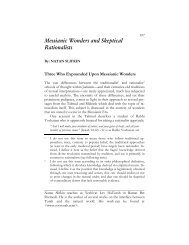Is There a Disconnect between Torah Learning and ... - Hakirah.org
Is There a Disconnect between Torah Learning and ... - Hakirah.org
Is There a Disconnect between Torah Learning and ... - Hakirah.org
Create successful ePaper yourself
Turn your PDF publications into a flip-book with our unique Google optimized e-Paper software.
<strong>Is</strong> there a <strong>Disconnect</strong> <strong>between</strong> <strong>Torah</strong> <strong>Learning</strong> <strong>and</strong> <strong>Torah</strong> Living? : 55<br />
Furthermore, children should not only be allowed to ask<br />
questions but encouraged to do so. A student of mine related that<br />
when he was a young boy he asked a question in class. His rebbe told<br />
him that he should ask the question when he’s a little older. A few<br />
years later he asked another rebbe his question. This rebbe said, “By<br />
your age you should already know that.” And thus the question was<br />
never answered. “When was the window of opportunity to get an<br />
answer”? he wanted to know. <strong>There</strong> is nothing that disconnects<br />
<strong>Torah</strong> from life more than not being able to ask a question about it.<br />
A question is a child’s attempt to take <strong>Torah</strong> seriously, to say in<br />
effect, “If I understood <strong>Torah</strong> correctly it implies something about<br />
life, but I’m puzzled. Perhaps I saw life differently, please help me<br />
make sense of it.” Teachers who ignore such questions send a<br />
dangerous <strong>and</strong> terrible message to children. The message is, “This is<br />
what I say it says. Don’t ask questions. <strong>There</strong> are no answers. What it<br />
says <strong>and</strong> what you see in real life are not necessarily connected.”<br />
Children hearing this message get the wrong idea. They learn to<br />
disconnect <strong>Torah</strong> from life <strong>and</strong>, ultimately, life from <strong>Torah</strong>. We must<br />
send them a different message. We must connect their lives to <strong>Torah</strong>.<br />
They must learn that the two are inseparable, as the following<br />
anecdote involving Reb Yaakov 60 demonstrates.<br />
A renowned professor of mathematics, Dr. Trachtenberg, became<br />
a baal tshuva <strong>and</strong> a talmid of Yeshiva Slobodka, thanks to the<br />
influence of the brilliant versatility of Reb Yaakov [Kamenetzky]<br />
<strong>and</strong> his all-consuming love for every aspect of <strong>Torah</strong>. The<br />
professor gained his respect for <strong>Torah</strong> when he became acquainted<br />
with Reb Yaakov <strong>and</strong> was overwhelmed by the profound<br />
underst<strong>and</strong>ing of mathematics which this young talmid chochom had<br />
mastered in one evening of leafing through some mathematics<br />
textbooks in the home of a relative.<br />
His subsequent involvement in Slobodka was threatened with<br />
disaster when his chavrusa refused to continue learning with him.<br />
They had been studying a Talmudic issue relating to a strip of l<strong>and</strong><br />
[protruding] from the city of Akko. The professor challenged one<br />
opinion in the Gemara on the grounds that it was inconsistent with<br />
what appeared on a map of the area. “How can I continue to learn<br />
60 From “HaGaon Rav Yaakov Kamenetzky זצ "ל His Life <strong>and</strong><br />
Teachings,” p. 105, published by Chug Talmidei Rabbeinu Yaakov<br />
Kaminetzky, Monsey, NY: distributed by Feldheim, 2000.
















